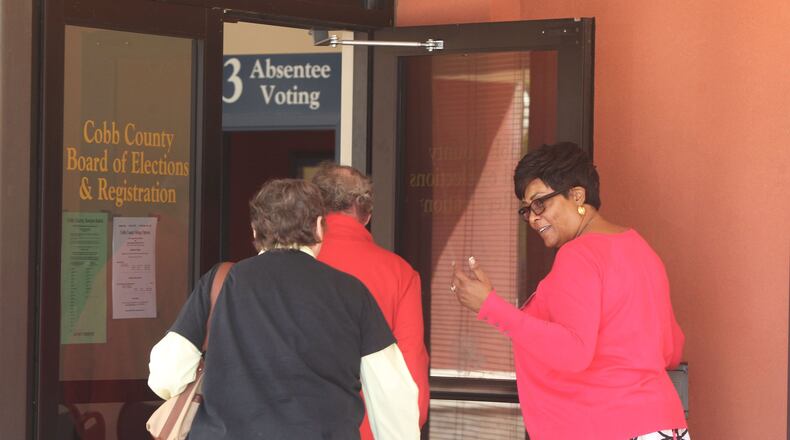White, older voters dominated early voting ahead of Tuesday's 6th Congressional District special election, a fact that would normally bode well for Republican candidates in the district's northern Atlanta suburbs.
These voters' political allegiance, however, may be more split than those numbers show.
An analysis of state voter data by The Atlanta Journal-Constitution shows that about two-thirds of early voters in the special election also voted in last year’s presidential primary, when voters must choose only one political party ballot.
And the split between those pulling GOP ballots and those pulling Democratic ballots is a tie until the second decimal: 33.89 percent requested a Republican ballot and 33.81 percent requested a Democratic one.
That leaves another one-third of early voters as a potential tossup in the nationally watched race to replace former U.S. Rep. Tom Price, which has drawn 18 candidates in what many have described as an early barometer on the presidency of Donald Trump.
By the numbers
97 percent — Early voters who also voted in the November presidential election. Some 82 percent of them voted in the 2012 presidential election, and 75 percent of them voted in the 2008 presidential election. So this is a politically active group.
74.1 percent — Nearly three out of every four early voters is white. That has outpaced the district, since only 66 percent of its registered voters are white.
11.5 percent — Millennials only make up about one-ninth of early voters, despite accounting for about one-quarter of the district’s electorate. Voters we call baby boomers plus, those age 52 and older, make up nearly 67 percent of those casting early ballots — even though they only make up about 42 percent of the district’s registered voters.
9 percent — Early-voter turnout compared with the more than 519,000 registered voters in the 6th District.
What it means
Early voting in the 6th District ended Friday, with voting set to resume Tuesday on Election Day. After three weeks of early voting in the district, more than 50,000 voters had cast an early ballot as of Friday morning. These numbers reflect that effort (although they obviously don't include everybody).
It’s possible, too, that voters’ party preferences in last year’s presidential primary may not signal who they truly support. Voters in Georgia are not required to register by party. And while the state required voters to pick only one party’s primary election ballot, there’s no requirement that they pick one from the party they align with most often.
Still, it’s an indicator that in this case seems to have solid footing given these early voters’ participation in presidential elections goes back to 2008.
While final turnout for special elections is usually tricky to predict — it is historically lower than for regular elections — many of those who voted early in the 6th District appear to be engaged voters who approached this special election in a way similar to how they would approach a primary.
Keep Reading
The Latest
Featured




